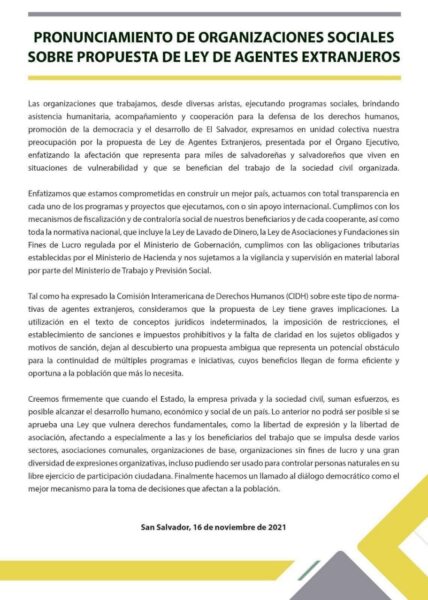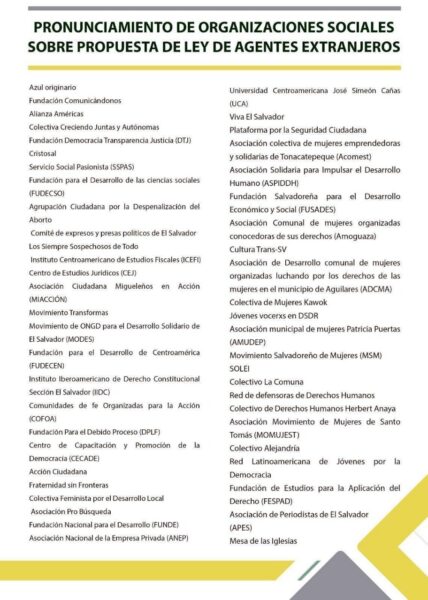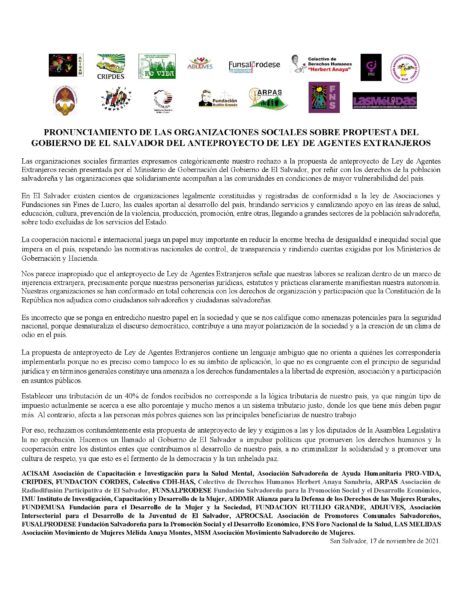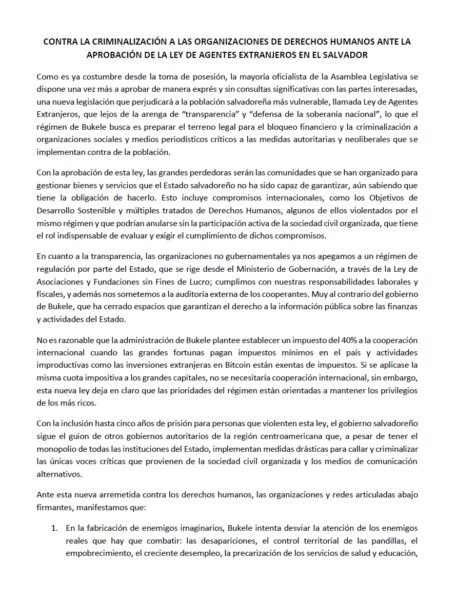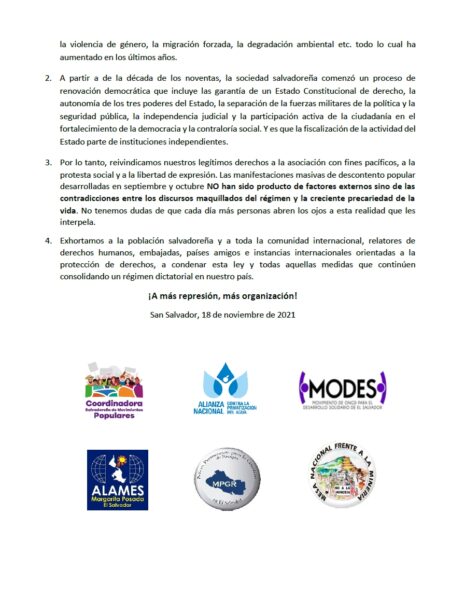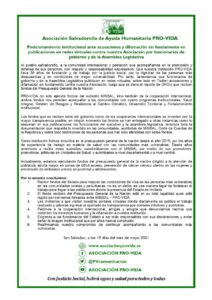Advocacy, Human Rights, Politics
Reactions to the Foreign Agents Law
Since the Salvadoran government announced its intention to pass a “Foreign agents Law” that would create a new tax of 40% and a fine of up to $10,000 dollars to organizations deemed to be attempting against “national security”, several organizations and collectives have reacted, especially after Tuesday’s meeting where the Nuevas Ideas representatives approved a new article that establishes a penalty of 2 to 5 years in prison for natural persons or representatives of foreign agents who “contravene public order, national security or State sovereignty, making use of funds received by a foreigner sender”.
One of the first statements shared states:
As the International Commission on Human Rights (IACHR) has expressed about this type of regulations on foreign agents, we consider that this proposal has serious implications. The use of broad legal concepts, the imposition of restrictions, the establishment of prohibitive sanctions and taxes, and the lack of clarity in the obligated subjects and reasons for sanction, reveal an ambiguous proposal that represents a potential obstacle to the continuation of multiple programs and initiatives, the benefits of which reach the population that needs it most in an efficient and timely manner.
Another statement shared by other social organizations reads:
It seems inappropriate to us that the draft of this law indicates that our work is carried out within a framework of foreign interference, precisely because our legal status, by-laws and practices clearly show our autonomy. Our organizations have been formed in total coherence with the rights of organization and participation that the Constitution awards us as Salvadoran citizens.
It is wrong that our role in society is called into question and that we are classified as potential threats to national security, because this attempts against the democratic discourse, contributes to a greater polarization of society and creates a climate of hatred in the country .
The proposed draft contains ambiguous language that does not guide who should implement it. It is not clear and neither is its scope, which is not consistent with the principle of legal certainty. In general terms constitutes a threat to the fundamental rights to freedom of expression, association and participation in public affairs.
Establishing a taxation of 40% of funds received does not correspond to the tax logic of our country. No tax currently comes close to that high percentage and much less to a fair taxation system, where those who have more must pay more. On the contrary, it affects the poorest people who are the main beneficiaries of our work.
In a press conference held today (Watch it here), the following statement was read:
Regarding transparency, NGOs already adhere to State regulations, implemented by the Ministry of the Interior, through the Law of Non-Profits and Foundations. We comply with our labor and fiscal responsibilities, and we also comply with external auditing from our donors. Quite the opposite to the Bukele administration, which has closed spaces that guarantee the right to public information on the finances and activities of the State.
It is unreasonable for the Bukele administration to raise a 40% tax on international cooperation when large fortunes pay minimal taxes in the country and unproductive activities such as foreign investments in Bitcoin are exempt from tax. If the same tax quota were applied to large capitals, international cooperation would not be needed, however, this new law makes it clear that the regime’s priorities are oriented to maintaining the privileges of the richest.
With the inclusion of up to five years in prison for people who violate this law, the Salvadoran government follows the script of other authoritarian governments in the Central American region that, despite having the monopoly of all State institutions, implement drastic measures to silence and criminalize the only critical voices that come from organized civil society and the alternative media.
The Salvadoran social movement is not the only one reacting.
“By labeling journalists and outlets as foreign agents, President Bukele is taking even more aggressive steps to limit the space for independent, critical media in El Salvador,” said Natalie Southwick, CPJ’s Latin America and the Caribbean program coordinator, in New York. “El Salvador’s congress should reject this misguided law and allow the press to work freely, instead of punishing investigative reporters for doing their jobs.”
“This draft ‘Foreign Agents Law’ introduces requirements that could be used in a discretionary manner by public authorities to control and limit the work of civil society and the press. The misuse of such legislation would impose a serious setback for human rights. We call on the government of El Salvador to ensure that all laws and policies that regulate civil society guarantee the rights to freedom of association, assembly and expression” said Débora Leão, CIVICUS Monitor’s Americas Researcher.
The UN Special Rapporteur on Human Rights Defenders has also expressed her concern:
Very concerning: foreign agent law being fast-tracked in El Salvador. It would apparently include 40%tax on foreign funding,closure of orgs for violations & 2-5 yrs in prison for 'activities against the national interest'. This would be clear violation of🇸🇻's int'l HR commitments
— Mary Lawlor UN Special Rapporteur HRDs (@MaryLawlorhrds) November 17, 2021
The Embassy of Germany has also reacted by stating that all their projects at community level are “on hold” until more information is provided.
Read AP’s coverage of these developments here.


